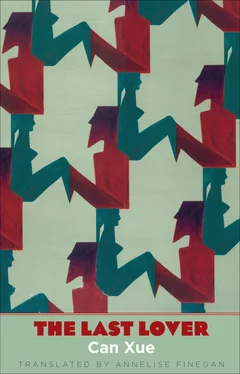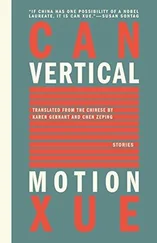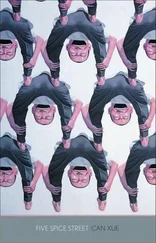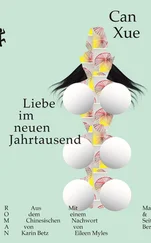“Mother, I’m here.”
“Daniel, what do you think of this?”
“I’m truly happy, Mother. Soon we will reach the end of the bridge. Do you hear the roaring of the river?”
Maria couldn’t see Daniel, but she knew he was nearby. This mutual searching and pursuing in the nighttime sent a warm current through Maria’s heart. After so many years, she experienced for the first time the way blood kept relatives together. Maria touched the enormous book pages with a shaking finger. She touched one after another of the letters protruding from the pages, and those letters jumped slightly, giving off electricity. Suddenly she comprehended the book’s meaning. The book told of an ancient, deserted beach. Someone climbed onto the bank from the sea. Sea birds cried ominously in the air. “That man is Joe,” Maria spoke quietly. Then her finger touched the word “Joe.” “Joe, is it you?” she asked.
“Of course it’s Father. Why don’t you believe it?” Daniel spoke in the dark. “Touch it again, everything is inside that book.”
Next Maria touched the description having to do with her African cats. The book didn’t tell of her cats in the present, but rather of long ago when they were still in Africa. They had just been born then, and were two little kittens. The sun of the African continent irritated their eyes so they could not open them. But why did the light-brown cat have only three legs? It had lost its leg later, in the graveyard.
“It always had only three legs. You just hadn’t noticed,” Daniel spoke again.
“Daniel, can’t you come over here?”
“I can’t, Mother.”
Maria touched the surface of another book. This book had an illustration of small snakes. Her hand kept touching them, and the snakes began to slither. Maria feared the desire inside her body and circled around behind the book, her back to its spine. She thought, over several decades of uninterrupted reading, her Joe had created this forest. And he hadn’t removed her from it. Once she entered, she blended into this place. In the su su rustling sound made by the pages, a world of writing appeared in her mind. She realized that for many years everything she’d woven was this writing. So familiar, so pleasing — was this happiness? She began to walk from one book to another. Dry leaves made noise under her feet; her feet touched a few small stones; she even heard the song of a nightingale. It was inside the pages of the largest book, singing and then pausing.
“Mother, you should speak with Father. In the square his ears are listening carefully. That ear hung on a tree is flapping ceaselessly with thirst.”
“Joe, your story has come back.”
“Wonderful, Mama, Father hears and is contented.”
“Daniel, if a man expends a lifetime of energy changing himself into a forest of stories, then does this man still belong to us?”
“He doesn’t belong to us, but is with us every day.”
“Thank you, son.”
“But Mother, you don’t belong to me and Father either. I saw you walking in the woods, your silhouette so long and thin, so unreal, your entire body full of electricity.”
There was a dim light in the forest of books, but when Maria looked up she couldn’t see the sky. Was there even a sky? There were grass, stones, a path, and she heard water flowing from a spring. But the air was filled with the fine smell of old books. This was Joe’s story. This story belonged to her, forever. Maria’s heart was full of gratitude. She pricked her ears, awaiting the nightingale’s singing again. She waited till it sang, but it wasn’t one call, it was many, many calls. One rising as another fell.
Lisa did not go home after she left Maria’s rose garden. She turned into a narrow street and stood at the door of Joyner’s flower shop. Someone waved her into the shop, but it was dark and she couldn’t see who it was. Once her eyes adjusted she finally saw Joyner. However, this wasn’t the same Joyner as before. Except that her face gave Lisa a slight feeling of familiarity, she’d changed completely — she’d become a fat middle-aged woman. The main difference was in how her movements were hampered. She strained and sat down in a wicker chair, placing herself among the tulips. The darkness of her surroundings made her face look even more pallid.
“Did you come to see Vincent?” Joyner asked sternly.
“Yes, I’m looking for him.”
Lisa felt dizzy, because it was suddenly dark inside the room. She couldn’t see anything.
“These are tulips from the Netherlands. On your right are yellow roses, and also violets. Did you come to see Vincent?” she asked again, her tone even more severe.
“Yes. Vincent. . Could he be here?”
“Step over my body, and you will be able to see him. You need to step boldly, raise your foot!”
Numerous giant lightbulbs, as bright as snow, suddenly turned on. They shone in Lisa’s eyes and she still could not see. She felt that she had been placed in a square, perhaps a competition arena. No matter what direction she went in, she didn’t bump into anything. Should she go on? As she was thinking this, she had already raised her foot.
“Vincent, I want to speak to you!” Lisa shouted, so excited her face grew pink.
An ocean of light spread in all directions. Her voice reverberated for a long time. She still couldn’t see. She was moving ahead, but she couldn’t even see her own feet. She suddenly thought, Maybe this was a snowcapped mountain? Long ago, Vincent had said to her that letting the light of a snowy mountain become the light inside one’s eyes would surely be fascinating. Lisa wanted to speak to him now about her own feeling of “blindness.” Joyner had not deceived her. Vincent was nearby. In the midst of the light she saw his inner heart. This light was a cold light, but her eyes were suited to it.
“Vincent, I want to speak with you!” she shouted again.
She felt profoundly that Vincent had transformed into this light. At this very moment he was touching her neck, her eyes. She recalled the events that had just happened. Wasn’t she in the flower shop not far from the office, where she’d met the black woman, Joyner, and then come here? Lisa didn’t like flowers, and she didn’t plant flowers, so why had she gone to the flower shop?
“That kind of story is concealed in every corner of the world.”
In her mind this line of words appeared distinctly.
At the end of the ocean of light a shadow appeared. It looked like a crowd of people, or of beasts. Lisa sensed a bugle sounding in the darkness of her abdomen. Her feet stumbled on something and she almost fell over, but she didn’t fall. She spread her arms like a giant bird trying to keep its balance, then, staggering, flapped ahead. The more anxious she grew, the more slowly she advanced. But she made out that the distant shadow of the army was growing stronger, and it was expanding by degrees in her direction. She even saw the corner of a red flag, guns, and litters, and gunpowder smoke slowly rising into the air. A memory of her childhood revived in an instant. On the solemn grounds of a large mansion, she and her mother were summoning their courage to attack a mud frog. Her mother pounced into the pond and climbed back out, drenched. She made Lisa listen to the violent, sudden sound of drumbeats. They were army drums. Thereby their home became much darker.
CAN XUE is the pseudonym of Deng Xiaohua, author of many novels, short works of fiction, and volumes of literary criticism in Chinese. Can Xue’s books in English include Five Spice Street and Vertical Motion: Stories . She lives in Beijing.
ANNELISE FINEGAN WASMOEN is an editor and a literary translator. She is pursuing a Ph.D. in Comparative Literature at Washington University in St. Louis.












